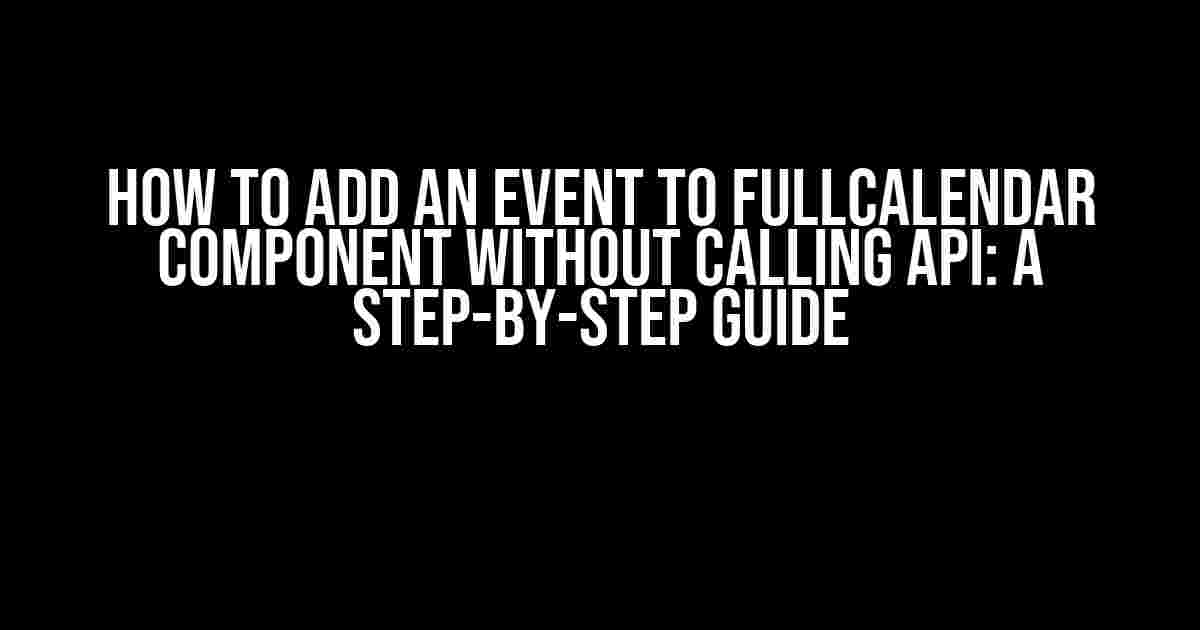Are you tired of making unnecessary API calls every time you want to add an event to your FullCalendar component? Well, you’re in luck because today we’re going to explore a more efficient approach to adding events to your calendar without calling the API. This method is not only faster but also more convenient, allowing you to take full control of your calendar events.
Why Avoid API Calls?
Before we dive into the solution, let’s quickly discuss why avoiding API calls is beneficial. Here are a few reasons:
- Faster Performance: API calls can be slow and may cause lag in your application, especially if you’re dealing with a large number of events.
- Reduced Server Load: By not making API calls, you reduce the load on your server, making it more efficient and less prone to crashes.
- Better User Experience: With faster event addition, users can quickly add events without waiting for the API to respond, resulting in a smoother user experience.
Prerequisites
Before we begin, make sure you have the following:
- FullCalendar component installed in your project.
- A basic understanding of JavaScript and HTML.
- A willingness to learn and adapt to new coding techniques!
Step 1: Create a Local Event Array
The first step in adding events to your FullCalendar component without calling the API is to create a local event array. This array will store all the events that you want to display on your calendar.
let localEvents = [
{
title: 'Event 1',
start: '2022-07-01 10:00:00',
end: '2022-07-01 12:00:00'
},
{
title: 'Event 2',
start: '2022-07-02 09:00:00',
end: '2022-07-02 11:00:00'
},
{
title: 'Event 3',
start: '2022-07-03 10:00:00',
end: '2022-07-03 12:00:00'
}
];Step 2: Initialize the FullCalendar Component
Now that we have our local event array, let’s initialize the FullCalendar component. Make sure to include the necessary JavaScript and CSS files in your project.
<div id="calendar"></div>
<script>
let calendar = new FullCalendar.Calendar(document.getElementById('calendar'), {
initialView: 'dayGridMonth',
events: localEvents
});
calendar.render();
</script>Step 3: Add a Button to Add New Events
To add new events to our calendar, we’ll need a button that triggers a JavaScript function. Let’s create a simple button and attach a click event listener to it.
<button id="add-event">Add Event</button>
<script>
document.getElementById('add-event').addEventListener('click', addNewEvent);
</script>Step 4: Create the addNewEvent Function
The addNewEvent function will be responsible for adding new events to our local event array and updating the FullCalendar component. Let’s create the function:
function addNewEvent() {
let newEvent = {
title: prompt('Enter event title:'),
start: prompt('Enter start date and time (YYYY-MM-DD HH:MM:SS):'),
end: prompt('Enter end date and time (YYYY-MM-DD HH:MM:SS):')
};
localEvents.push(newEvent);
calendar.refetchEvents();
}How it Works
Here’s what’s happening behind the scenes:
- The user clicks the “Add Event” button, triggering the addNewEvent function.
- The function prompts the user to enter the event title, start date, and end date.
- A new event object is created with the user-input data and added to the local event array.
- The calendar.refetchEvents() method is called to update the FullCalendar component with the new event.
Advantages and Limitations
This approach has several advantages, including:
- Faster event addition without API calls.
- Reduced server load and improved performance.
- Easy to implement and maintain.
However, this approach also has some limitations:
- Events are stored locally and may not be persisted across page reloads.
- Events may not be synchronized with the server or other users.
- Requires additional code to handle event editing and deletion.
Conclusion
In this article, we’ve explored a step-by-step guide on how to add events to a FullCalendar component without calling an API. By storing events locally and using the refetchEvents() method, we can efficiently add events to our calendar without sacrificing performance or user experience. While this approach has its limitations, it’s a great solution for applications that require fast event addition and reduced server load. Happy coding!
| Event Property | Description |
|---|---|
| title | Event title or name. |
| start | Event start date and time (YYYY-MM-DD HH:MM:SS). |
| end | Event end date and time (YYYY-MM-DD HH:MM:SS). |
Note: This article is for informational purposes only and is not affiliated with FullCalendar or its developers.
Here are 5 Questions and Answers about “how to add event to FullCalendar Component without calling API” in a creative voice and tone:
Frequently Asked Question
Get ready to master the art of adding events to FullCalendar Component without calling API! Here are the most frequently asked questions to get you started.
Q: Why do I need to add events to FullCalendar Component without calling API?
A: You might need to add events to FullCalendar Component without calling API when you want to optimize your application’s performance, reduce server load, or work with locally stored data. Plus, it’s always a good idea to minimize API calls and keep your app snappy!
Q: Is it possible to add events to FullCalendar Component directly on the client-side?
A: Absolutely! You can add events to FullCalendar Component using JavaScript. Simply create a new event object and add it to the calendar’s `events` array. You can also use the `addEvent` method provided by FullCalendar.
Q: Can I add events to FullCalendar Component using a JavaScript array?
A: Yes, you can! Create a JavaScript array of event objects and pass it to the FullCalendar component using the `events` property. Each event object should contain properties like `title`, `start`, and `end` dates.
Q: How do I update the FullCalendar Component after adding a new event?
A: After adding a new event, call the `renderEvents` method to update the FullCalendar Component. This will refresh the calendar and display the new event. You can also use the `refetchEvents` method to reload the entire events array.
Q: Are there any best practices for adding events to FullCalendar Component without calling API?
A: Yes, always validate and sanitize user input to prevent errors and security vulnerabilities. Also, consider using a local storage solution to store events and sync them later. Finally, optimize your event data to minimize the payload and improve performance.


